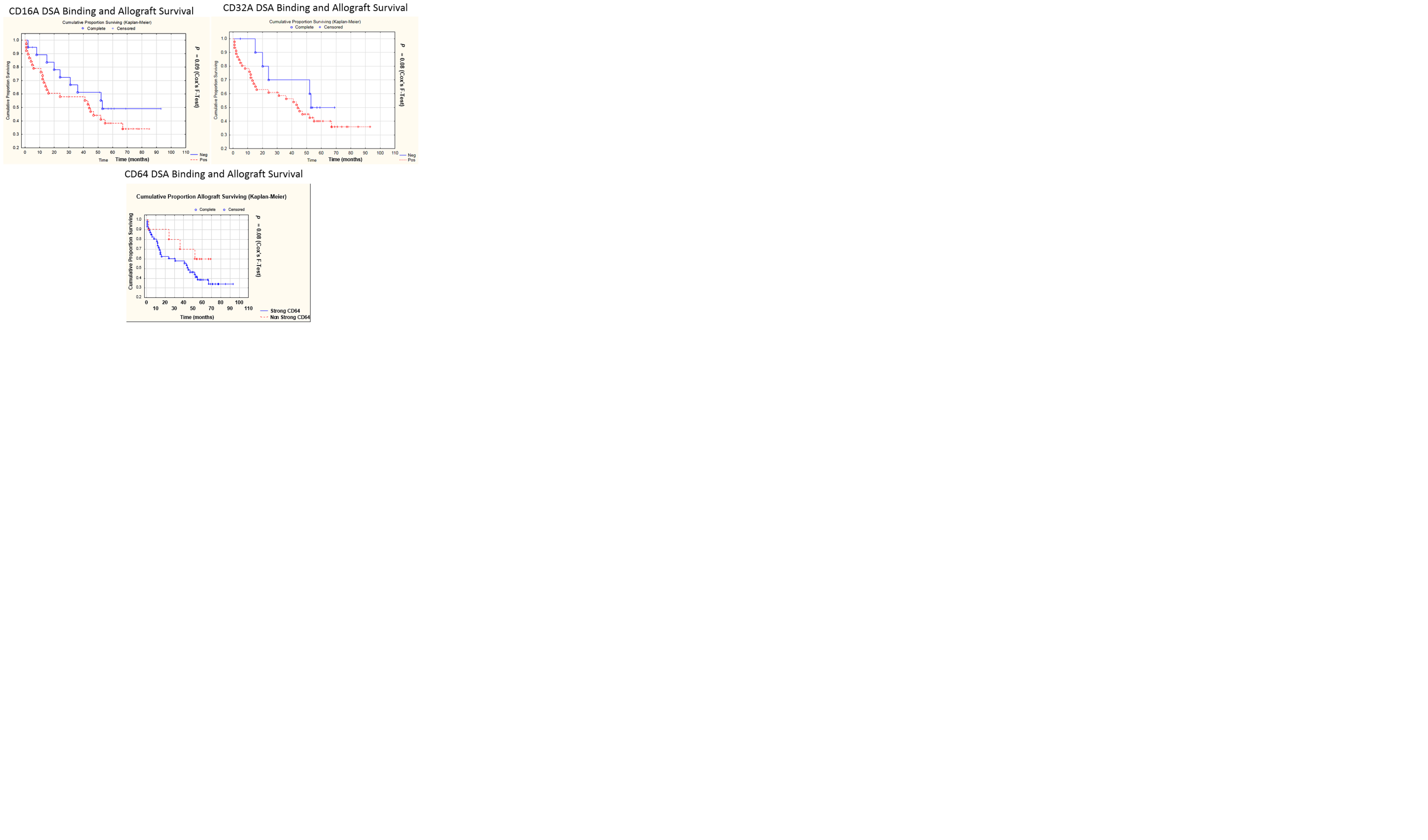Global Analysis of Fc-gamma Receptors Binding Capacity of Human Leukocyte Antigen Donor Specific Antibody
University of Cincinnati Academic Health Center, Cincinnati, OH
Meeting: 2019 American Transplant Congress
Abstract number: B70
Keywords: Effector mechanisms, HLA antibodies, Rejection, Survival
Session Information
Session Name: Poster Session B: Biomarkers, Immune Monitoring and Outcomes
Session Type: Poster Session
Date: Sunday, June 2, 2019
Session Time: 6:00pm-7:00pm
 Presentation Time: 6:00pm-7:00pm
Presentation Time: 6:00pm-7:00pm
Location: Hall C & D
*Purpose: Functional assessment of anti-HLA antibodies has historically been limited to complement-binding assays. However, antibodies are capable of inducing injury by complement-independent mechanisms, including Fc-gamma receptor (FcγR) engagement. Analysis of CD64 binding capacity of DSA has previously been demonstrated to correlate strongly with allograft survival. Amongst other FcγRs, CD16A is involved in antibody-dependent cellular cytotoxicity, while CD32A is the major phagocytic FcγR in humans. We have hypothesized that comprehensive assessment of the pathogenic potential of anti-HLA antibodies requires global assessment of FcγR binding capacity.
*Methods: Fifty-six renal transplant patients with biopsy-proven antibody mediated rejection (AMR) were included in this study (17 early AMR and 39 late AMR; this patient group is identical to the group previously used to validate the CD64 FcγR assay). All patients exhibited anti-HLA donor specific antibodies (DSA) detected and identified by single-antigen multiplex bead array (SAB), with anti-IgG type-specific and anti-IgG1-4 subtype specific secondary antibody. C1q and FcγR binding capacity of DSA was also investigated by SAB. Histologic response included acute and chronic Banff components and C4d scoring, both at the time of AMR diagnosis, and after therapy.
*Results: Sera at the time of acute rejection tested positive for CD16A in 37 patients, 45 patients for CD32A, CD64 strong in 35, and 22 for C1q binding. All positive cases respected the cross-reactive groups of DSA public epitopes. Forty-one biopsies were C4d positive. CD16A binding DSA was associated with increased v, cg, ci and ct scores, CD32A was associated with higher ptc, g+ptc and cg scores, while CD64 associated with higher ptc, cg and ct scores. CD32A exhibited a stronger association with IgG1 + IgG3 DSA subtype (table). All three FcγR binding were associated with decreased allograft survival (figure). C1q binding did not show any association with allograft survival, although it was associated with increased C4d, t, cg, ci and ct scores.
*Conclusions: CD16A, CD32A, and CD64 FcγR binding capacity of DSA provides information unique to that derived from generic IgG and C1q SAB, and correlates with 1) SAB IgG epitope pattern, 2) IgG1 and IgG3 isotype specific SAB testing, 3) Banff component scoring, and 4) failure censored renal allograft survival following AMR. This initial validation analysis indicates that assessment of FcγR binding capacity of HLA antibodies provides useful clinical information.
To cite this abstract in AMA style:
Woodle ES, Girnita A. Global Analysis of Fc-gamma Receptors Binding Capacity of Human Leukocyte Antigen Donor Specific Antibody [abstract]. Am J Transplant. 2019; 19 (suppl 3). https://atcmeetingabstracts.com/abstract/global-analysis-of-fc-gamma-receptors-binding-capacity-of-human-leukocyte-antigen-donor-specific-antibody/. Accessed February 19, 2026.« Back to 2019 American Transplant Congress


